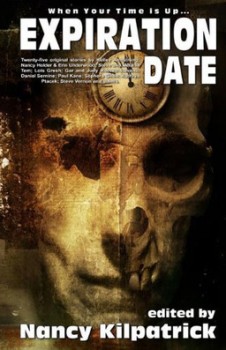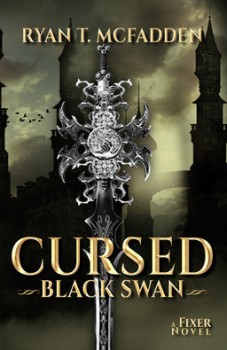Wordsmiths: An Interview with Aurora Award-winner Ryan McFadden
 For my fourth installment in the Wordsmiths interview series, I had the pleasure of talking shop with Ryan T. McFadden, three-time winner of the Aurora Award and author most recently of the fantasy novel Cursed: Black Swan, from Dragon Moon Press. I’ve known Ryan for a few years now, since my first-ever panel at Can*Con in Ottawa — he’s not only a fabulous writer, he’s also good people, so I’m thrilled to be able to cast a spotlight on him this week. Read on below for my discussion with Ryan on the pressures of being a writer, influences on what we write, and past exploits. Enjoy!
For my fourth installment in the Wordsmiths interview series, I had the pleasure of talking shop with Ryan T. McFadden, three-time winner of the Aurora Award and author most recently of the fantasy novel Cursed: Black Swan, from Dragon Moon Press. I’ve known Ryan for a few years now, since my first-ever panel at Can*Con in Ottawa — he’s not only a fabulous writer, he’s also good people, so I’m thrilled to be able to cast a spotlight on him this week. Read on below for my discussion with Ryan on the pressures of being a writer, influences on what we write, and past exploits. Enjoy!
Ryan’s bio (possibly pilfered from his website): Ryan T. McFadden is a writer of fantasy and horror, with short stories and novellas published through Dragon Moon Press, Edge SF & F, and Absolute X-Press. In 2014, his novella “Ghost in the Machine” won the Aurora Award (Canada’s most prestigious award for SF&F) for Short Fiction. His motley past involved such dangerous work as database administration, ice cream flavoring (seriously, that’s a thing), hockey league administration, screen printing, web design, furniture building, and home renovations. He lives in London, Ontario, with his two beautiful, but sometimes diabolical daughters, who he is sure are plotting to one day overthrow him. Check out Ryan on Twitter: @RyanTMcFadden.
I want to start with something I’ve meant to ask you in person but haven’t gotten around to yet. Having three Aurora Awards under your belt is a pretty big deal; do you find that these award wins (or even nominations) change your attitude as a writer at all?
Oddly, the three awards did change my view. Or actually, the first one did. The first one was for Women of the Apocalypse — which was very well received and really one of my first publications. For the first time, I had actual feedback… from strangers. And much of it was good! Like, unexpectedly good. And suddenly, when I sat down to write again, it felt like I had 1000 editors watching as I wrote. And it was crippling. My writing pace slowed to a crawl and I had a really hard time with it.
Luckily, I’ve since overcome that issue (and it took a lot of work). Since then, I’ve been nominated again, and I won in 2014 for Best Short English for my novella “Ghost in the Machine.” Once I was past the crippling editor-on-my-shoulder syndrome, the Aurora’s were a nice affirmation that maybe I don’t suck as badly as I think I do.
So how did you overcome that 1000-eyes-on-you sensation? That might be the most terrifying description of impostor syndrome I’ve ever heard.
It was mostly crippling. At that time, I was working on a collaborative world called the 10th Circle Project (co-edited with E.C. Bell). I remember spending 8 hours to come up with approximately 200 words. It wasn’t a good time. I actually thought my writing career was done. I tried a bunch of things but I’d say this went on for over a year. The blank page was terrifying.
I tried all these different writing techniques, none of which worked. Then I found the Snowflake method. It’s an outlining method that also deals with characters. Once I used that method a couple of times, I started being able to use that method subconsciously again and I was off to the races. Luckily.
At the risk of going a little existential, do you think we writers get more affirmation/motivation from outside sources (like the Auroras) or internal ass-kicking and strategies like the Snowflake method?
That is a little existential! If you’re searching for external affirmation then writing will be a tough road. First, it’s not a given that you’ll *ever* receive external affirmation/motivation. I have five trunk novels (FIVE!) that will never see the light of day. So that was five novels that I wrote, that were sent out into the world, were sent back with big red REJECTION on them. Then, away into the trunk they went.
I think writers need to be self motivated. I remember back thinking ‘If only I could publish a short story…’ Then I published a short story. It was awesome, for a time. Then it was ‘if only I could publish in THAT publication’ then everything would be right with the world. Then it was ‘if only I could be nominated…’ and so on and so on. A receding horizon is how another writer described it to me. We always want that NEXT thing.

I feel slightly better about my three trunked novels – and totally agree on the self-motivation. Changing tacks (since I can’t think of a humorous segue) I noticed that Cursed: Black Swan and Through a Glass Darkly both seem to be based around this premise of someone trying to complete a job that goes horribly awry — and you run a home renovation business. Any influences from your day job on these books, or your writing in general?
Sadly, no nice comparisons between my writing and my day job. Yeah, there’s foundation, finishing, and those kind of broad strokes, but I wrote those stories long before I was ever in the renovation business. Before renovations, I was in marketing and web design.
The idea of unfinished jobs comes more from my influences. Though I write in a variety of settings (space opera, sword and sorcery, present SF) really all my stories are crime stories. So though I’m not considered a crime writer, that’s really what I gravitate to (the way Blade Runner movie was a noir).
Why the focus on writing crime stories? Is it something you did intentionally, or realized after you’d written a few?
There’s always a big debate about deconstructing writers’ work. There’s that meme that you might’ve seen that has ‘What the Author Meant’ versus ‘What your English Teacher Meant.’ In this case, the English teacher thinks a particular passage about blue curtains was symbolic of a deep depression and nihilism where the author actually just meant ‘the curtains are blue.’
Oddly, I don’t think a writer should have a lot of input into how others perceive their work. I always found describing my work like describing a dream: I often come up with the meaning (or theme) as I’m telling someone else. I don’t know how many times I was describing a story to someone when BOOM, I suddenly realized the subtext was about something completely different than what it appeared outwardly. For instance, I wrote a super hero story that I *thought* was about doing whatever it takes to help someone you love. Instead, it turned out the main character wasn’t nearly as good as a person as he thought — but he’d do anything to make people believe he was that pillar of strength and goodness. In the end, he was an ass.
What I’m getting at is that the writer might be the least qualified to judge why they write what they write. At least my own process. I never set out with a particular theme in mind but the theme just happens to crop up on its own.
Yeah, that was a long-winded answer about why I focus on crime writing. ‘I’m not sure’ should be my answer. It took years to realize that many of my most successful stories were crime based — fantasy, SF, or even horror. None are specifically labelled as crime. I don’t have a real desire to rob a bank (not a huge desire anyway). I like the thought that we’re all people with different roles to play. Maybe there’s something there worth exploring. Not sure.
I should probably know better than to ask a question like that, being an English teacher — though one of my key lessons is that I have NO IDEA what a writer intended with their work, and any teacher who claims that with certainty is a hack.
Any other surprise realisations with specific works after they were completed? I’ve had that a few times with my stories, so I’m fascinated about it happening with other writers.
You probably tell your students that you have NO IDEA what the writer intended because you have the distinct advantage of viewing both perspectives; both the academic and the writer.
I’ve had some very surprising realizations. Like I alluded to before, once a story is completed and I’m telling someone the plot… I’ll pause as I realize what that passage really means to me. It’s not about harpies – it’s about being torn in a thousand different directions. It’s not about amputees — it’s about feelings of inadequacies. I’m always kind of amazed when I discover the true symbolism of a passage. They’re not lightning bolts that allow me to self help or anything like that. Just an understanding. In no particular order, I’ve discovered what I really think of myself. And sometimes I can be a jerk. In no particular order, I’ve discovered that: I don’t think I’m a particularly good person, that I’m half a man, that I don’t make my own decisions.
Wow, that’s like self-therapy in the form of writing. There’s probably a dark and scary path in there somewhere. Have you written a story or novel that’s intended as a standalone, and then someone reads it and says, “Wow, what happens next in this world? Tell me more!” That particular sort of epiphany has thrown me recently.
It’s happened to me a few times. In particular a story called “A Rash of Flowers” in the Blood and Water anthology (edited by Hayden Trenholm). The story was one of those tales where it ended kinda bleak but there a sliver of hope — as if this terrible event might’ve been the spark that ignited a revolution.
Except… I don’t want to tell anymore of that tale. I don’t know how you or other writers feel about it, but when a story is done, it’s done. In this case. Oddly, when I’m finished writing a story, even the details about it start to fade from my consciousness (I honestly can say I have no clue how “Rash of Flowers” ends — I can’t remember if my protagonist lived or died!).
I have the mindset with my short fiction — I almost never think beyond the story itself. It’s a different demon than novel writing (at least for me).
So I did a little research for this interview, as good interviewers should, and I found that “5 Facts” section on your website. I’ve gotta ask: what’s your favorite skill you’ve learned (possibly starting with “s”) and does that learning feed your writing?
 Gak, short fiction writing is way different than novel writing. Novel writing is easy. Short fiction is so damned hard. Every word is important, every sentence building on the one before it. World creation, characterization — all in 4000 words or less!
Gak, short fiction writing is way different than novel writing. Novel writing is easy. Short fiction is so damned hard. Every word is important, every sentence building on the one before it. World creation, characterization — all in 4000 words or less!
5 facts (scurries to ryanmcfadden.com to read what I actually put there). Yeah, many skills work their way into writing. I remember way back before MMA took off that I was training in Ju-jitsu, Judo, Tae Kwon Do, Muay Thai — way before anyone else was doing it. I incorporated many of those moves into my writing. I believe it gave a good sense of realism. Kind of like watching Lethal Weapon when it was first released. It was almost cutting edge (in fact, one of the Gracies choreographed the fight scenes). Now, the fight is almost quaint.
As for my favourite skill — that’s a tough one! I like to see how things are put together. How entire systems work. Wood working was pretty cool. I flavored ice cream for Nestle for a time (I was a mixman!) but that wasn’t nearly as exciting as it sounds.
Flavoring ice cream sounds like an awesome job! It also doesn’t take much to excite me.
This has been a blast, Ryan. Before we bring it to a close, anything you’re working on now or stuff you’d like to plug? I’ll throw in a huge recommendation for Cursed: Black Swan, which was a lot of fun to read.
It was a cool job. Of course, with the amount of mistakes I made over the time, I would’ve fired me several times over. I boiled over several yogurt vats (imagine the old Bugs Bunny cartoons when someone would put the soap in the laundry machine and suds would overflow — now imagine that those suds are above the boiling temperature of water. Now do that twice… in a week).
I’m working a bunch of projects. The first, of course, is the follow up to Cursed, which is called The Secret of Folloman Finn. More shenanigans from Nathaniel as he blunders his way from one bad job to another. Then I’m working on an epic fantasy called The Beast no the Throne. It’s more of a guns and sorcery story filled with trains, and guns, and Hellions, and sharks (always sharks). The problem with it: I’m sitting at 120,000 words with no end in sight. Oops.
Thanks for having me!
If you’re a fan of direct, light-hearted but character driven fantasy, check out Cursed: Black Swan, the first of a non-sequential series featuring Nathaniel, who fancies himself a fixer because he bumbles or cons his ways into success. Imagine Peter Quill before he meets the other Guardians, and you’ll have a good idea of the fun to expect.
An Ottawa teacher by day, Brandon has been published in On Spec, Third Flatiron Anthologies, and The 2017 Young Explorer’s Adventure Guide. His Stormtalons short story, “Wizard-sitting,” with the Ed Greenwood Group, is now available from Onder Librum and other platforms. Learn more at brandoncrilly.wordpress.com or on Twitter: @B_Crilly.